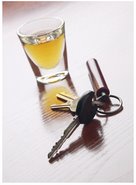After a particularly festive evening that included a few drinks at a friend's get-together last winter, K. Renfrew, a New York City resident who suffers from gastroesophageal reflux disease, also known as GERD, was overcome with the tell-tale symptoms of the illness. "There was a lot of pressure centered in my chest," she says. "It felt like an anxiety attack mixed up with a heart attack." No wonder: Alcohol is one of the biggest triggers of GERD.
With party season in high gear, doctors say men and women who suffer from GERD may also be in for a period of heartburn attacks. Although not all people with GERD have trouble with alcohol, many clearly do. "It's very individualized," says Dr. Philip Jaffe, associate professor of medicine at the University of Connecticut Health Center.
How alcohol worsens GERD. GERD is a condition in which the acidic juices that typically stay in the stomach back up into the esophagus, damaging its lining and causing a spate of symptoms, including chest pain, sore throats and, most common, heartburn. One reason patients develop GERD is because the lower esophageal sphincter, a clump of muscles separating the stomach from the esophagus, isn't working properly and doesn't form a tight seal as it should; gastric juices are then able to slip through. Even a few sips of liquor can cause the LES to work inefficiently, turning a once-happy partygoer into a miserable guest.
"Alcohol can immediately decrease the pressure of the LES," says Dr. Kristine Krueger, associate professor of medicine and medical director of the Digestive Health Center at the University of Louisville. "It makes [the LES] sit in an open position, and acid backs up." Doctors aren't certain which substances in alcohol are to blame. Some point to the ethanol in beer and hard liquor as the culprit, while others say the problem may be traceable to sulfites.
Another reason alcohol is a no-no: It dries the thin mucous layer lining the esophagus, which, for many chronic reflux sufferers, is already highly sensitive. Liquor also decreases peristalsis, the wave-like movements of the swallowing tube that help shift food and other substances, including acid, down to the stomach. "People can't clear the acid well," says Dr. Lauren Gerson, assistant professor of medicine at the Stanford University School of Medicine. When that happens, they can end up in agony.
Imbibing liquor also hinders the body's natural weapon against acid: the saliva. Loaded with bicarbonate, saliva can effectively neutralize acid in the esophagus. "But people who drink a lot of alcohol can impair the production of saliva," says Jaffe.
Red or white? Experts say no one beverage is to blame; beer and champagne, for example, may bring on a bad case of heartburn for one person and cause no aches and pains in the next, but doctors say many of their patients report red wine as a big culprit. No scientific research supports this finding, however. "That's purely anecdotal," says Gerson.
How much GERD sufferers imbibe and how potent their drinks are definitely play a role, though. No one can pinpoint exactly how much is too much, but "volume consumed plays a part," says Krueger. "The higher the alcohol content of a drink, the more it can cause injury."
Patients with severe GERD or who are especially prone to flare-ups after knocking back a few may want to consider abstaining from alcohol. But if total abstention isn’t practical, especially during the holidays, then at least drink sensible amounts. "Let's be honest," says Jaffe. "Life is short. It's important to have a good quality of life. We don't advocate drinking heavily but during the holidays, if you want to give a toast or have a glass of champagne, then it's possibly OK."
The recourseAside from moderation, some doctors say patients who take proton-pump inhibitors can lessen or even do away with the unpleasant GERD symptoms. "Many people with terrible reflux can drink moderately on special occasions when they're on medication," says Jaffe.
Other tips: Choose drinks that are diluted, such as wine spritzers or beer with ginger ale, and nibble on treats in-between sips to minimize the amount of alcohol consumed. Doctors also remind patients not to overeat in general, and not to gorge on foods that are known to trigger GERD symptoms, such as tomato-based sauces and greasy foods. Patients who have an especially hard time with heartburn and acid regurgitation at night, referred to by physicians as "supine refluxers," should stop drinking for at least a few hours before bedtime; the longer patients wait to go to sleep, the more time they allow gravity to work in their favor.
S. Jhoanna Robledo Wade is a freelance journalist based in New York.
Saturday, January 27, 2007
Subscribe to:
Post Comments (Atom)

4 comments:
Unfortunately, medical studies have revealed that NSAIDs are frequently the cause of peptic ulcers. It has also been found that they may cause GERD, as well as increase the severity of symptoms people with GERD experience. In fact, a three year study found that those who use NSAIDs were two times as likely to experience GERD symptoms compared to those who didn’t use NSAIDs at all.GERD SYMPTOMS in the rest of the article
You portrayed the topic well.. This article has helped me a lot. Anyway thanks a lot one more time for the great and informative publication.
cASINO qUEEN sT lOUIS
Great article full of useful information and very well written.
Nice article
Why We Love Bimatoprost (And You Should, Too)
Post a Comment